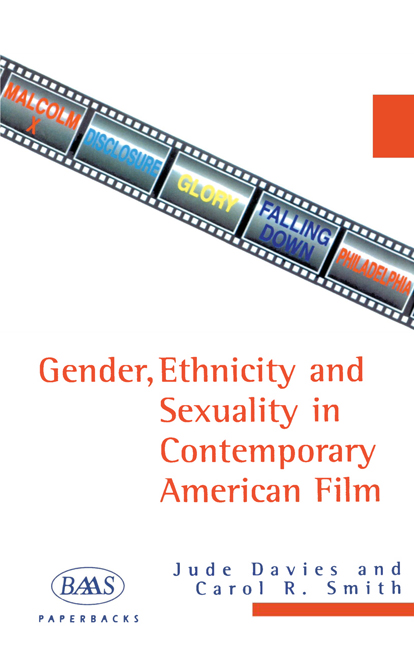Book contents
- Frontmatter
- Contents
- Acknowledgements
- Introduction: The Uses of Identity in Post-Reagan Hollywood Film
- 1 White Masculinity as Paternity: Michael Douglas, Fatherhood and the Uses of the American Family
- 2 Transactions in Race and Ethnicity: Positive, Negative and Interrogative Images of African Americans on Film
- 3 Putting the Homo into America: Reconstructing Gay Identities in the National Frame
- Conclusion: Aliens from Star Wars to Independence Day
- Index
- Miscellaneous Endmatter
Introduction: The Uses of Identity in Post-Reagan Hollywood Film
Published online by Cambridge University Press: 24 September 2020
- Frontmatter
- Contents
- Acknowledgements
- Introduction: The Uses of Identity in Post-Reagan Hollywood Film
- 1 White Masculinity as Paternity: Michael Douglas, Fatherhood and the Uses of the American Family
- 2 Transactions in Race and Ethnicity: Positive, Negative and Interrogative Images of African Americans on Film
- 3 Putting the Homo into America: Reconstructing Gay Identities in the National Frame
- Conclusion: Aliens from Star Wars to Independence Day
- Index
- Miscellaneous Endmatter
Summary
[An] insistence on ‘positive images’ … obscures the fact that ‘nice’ images might at times be as pernicious as overtly degrading ones, providing a bourgeois facade for paternalism, a more pervasive racism.
Robert Stam and Louise Spence, ‘Colonialism, Racism and Representation’While the movement away from demeaning stereotypes into a larger field of cultural representation has the potential for counterhegemonic effects, mainstream cinema reveals, for the most part, a disturbing reliance on narrative structures that foreground the bourgeois ideal as symbol of racial egalitarianism. In this sense, such representations transform historical demands for civil rights into images of class homogeneity — an ideological response to radical discourses of the 1960s that reiterates what Houston Baker calls, in another context, ‘America as immanent idea of boundless, classless, raceless possibility’.
Robyn Wiegman, ‘Black bodies/American commodities: Gender, race and the bourgeois ideal in contemporary film’.This book is not about the representation of various groups of Americans, defined in terms of gender, ethnicity and sexuality. Instead, we are concerned with the uses of cinematic images of identity. With reference to representations of identity and identity politics, the production and consumption of Hollywood movies have undergone substantial developments since the presidency of Ronald Reagan. In terms of production, this period has seen considerable penetration of non-white, non-straight, and non-male filmmakers into the Hollywood mainstream, while increasing market segmentation and sectionalisation of audiences have problematised the very notions of ‘mainstream’ and its other, the margins. A measure of these shifts was indicated in 1992 by Spike Lee's appeal to prominent African Americans to fund the completion of Malcolm X. The issue and its context attracted controversy; but what would have been almost unthinkable even as recently as the 1980s was that a major studio was prepared to spend as much as $18 million (out of a total original budget of $26 million) on a biopic of a black separatist icon. Although Lee and others have complained rightly that African American directors find it difficult to obtain block- buster-level budgets, the early 1990s have seen films directed by African Americans and other non-whites distributed much more widely and in greater numbers than ever.
- Type
- Chapter
- Information
- Publisher: Edinburgh University PressPrint publication year: 2020



